10 Ways to Fight Fatigue on a Vegan Diet
If you’re on a vegan or plant-based diet and are always feeling tired or run down, then you need to check out these 10 ways to fight fatigue on a vegan diet. I’m sharing these tips along with my personal story of fatigue on a vegan diet.

10 Ways to Fight Fatigue
Whether you’re new to a vegan or plant-based diet, or you’ve been doing it for awhile, you may start to experience fatigue, headaches, tiredness, or mood changes. Some of the common questions and concerns include:
- I went vegan or vegetarian and I’m feeling weak or tired.
- I went vegan and I’m feeling depressed.
- My adrenal fatigue got worse on a vegan or plant-based diet.
- I’m eating a vegan diet and getting dizzy spells.
If any of these issues related to you, then read on! You’ll probably find at least one tip or more that can help resolve your fatigue on a vegan or plant-based diet.
Plus, be sure to read the section at the end of this post to help determine if dietary changes may be necessary to help resolve your tiredness.
1. Get good quality sleep
Believe it or not, but the most common reason for fatigue is poor sleep, or not getting enough sleep.
I went through a period of several months where I would go to bed at a normal time, but wake up only 4-5 hours lately completely awake. So, rather than toss and turn for hours, I would get up but then be exhausted later in the day.
Whether you have insomnia like I had, or you have sleep apnea, hormone imbalances like estrogen dominance, or something else that is causing sleep disruptions, it is important to address this issue.
In regards to a plant-based diet and disrupted sleep, there could be several issues at play.
For instance, are you eating enough, especially later in the day? If you are waking up hungry, then you need to increase your calories overall. You may also need to adjust your macronutrients to increase satiety.
Secondly, have you developed any nutrient deficiencies on a vegan diet? Issues like low iron can lead to restless leg syndrome which can definitely make it harder to sleep. In this case, you’ll need to work with your healthcare provider to increase sources of iron (or maybe even take supplements) to increase your iron.
You may need to consult your healthcare provider to help rule out any other conditions that might be affecting your sleep. Once you get your sleep under control, you will likely feel less fatigue.
2. See professionals and get appropriate tests to identify medical problems
Don’t wait too long to try and figure out if your fatigue is related to health condition. Fatigue can often be related to an autoimmune disease such as Hashimoto’s Thyroiditis.
Women’s concerns about fatigue can often be dismissed by doctors, so it’s important to be your own advocate and ask that your thyroid levels be tested.
if not well-planned, vegan diets can lead to deficiencies in certain nutrients such as vitamin B12, omega-3 fatty acids, iron, and zinc, which are important for immune system function.
A deficiency in these nutrients could potentially contribute to immune dysregulation.
If your thyroid is healthy and you can rule out thyroid disease as the cause of your fatigue, then it’s also worth having your ferritin levels tested to make sure you aren’t anemic.
Learn more about ferritin testing and how you can order your own lab tests.
3. Take appropriate supplements for fatigue
Your doctor or healthcare provider can likely suggest some supplements to help with your tiredness.
Whether you are in need of more protein, more iron, or something else, it’s important to get some expert input about your individual situation.
And, be sure to check out this article with natural ways to increase energy which includes a whole list of supplements that can help.
You may also want to read my articles on the best supplements for women over 30 and the best supplements for women over 50.
4. Use a plant-based protein powder supplement and eat more protein rich plant foods
While many vegan diet advocates say that you can get all the protein you need from whole food plant sources, there are some women who need more protein.
This was the case for me when I was on a vegan diet. While I ultimately stopped being vegan, I usually felt less tired when I added a plant-based protein powder to my morning smoothie.
There are some great plant-based protein powders on the market now, and you can choose from a variety of ingredients including rice protein, pea protein, hemp, soy, and more. Just try a few different brands and see which one works best for you.
Check out why list of the best clean protein powders.
5. Practice stress management
Since there are so many stressors in the world right now, it’s that much more important to learn to manage that stress. If you don’t, then you will likely feel run down and not as energetic as you normally feel.
Stress management can include everything from meditation, sitting quietly, spending time with friends, being outside in nature, or journaling. Or, if you are truly suffering, you can also reach out to find a therapist who can help you develop coping skills.
6. Get appropriate exercise
While getting daily movement is important, you might need to make sure you aren’t working out too hard. Fatigue is an important indicator that you might be over-training or under-training.
Some experts say that most adults need about 30 minutes of exercise a day.
7. Drink green tea
While hyping yourself up on caffeine isn’t the best way to combat fatigue, a glass of green tea can help. In addition to being high in antioxidants, green tea also contains l-theanine. L-theanine can help improve focus and mood.
You can buy green tea loose or in bags, or you can also try match (learn about the health benefits of matcha). Don’t miss my recipe for Coconut Matcha Latte.
8. Eat a variety of plant-based foods with minimal processing
When you’re eating vegan, it can be tempting to turn to vegan junk foods. Fake meats are not healthy foods, and neither are sugar-filled vegan desserts. Learn more about the risks of plant-based meats.
Instead of eating processed foods with refined oils and sugars, it’s better to choose whole foods such as fruits, vegetables, legumes, grains (if they work for you), nuts and seeds.
If you are having a hard time figuring out how to eat on a vegan diet, then you might benefit from consulting a dietitian or nutritionist who can help you create a meal plan that is tailored to your individual needs.
You may also want to read this article about myths of a plant-based diet.
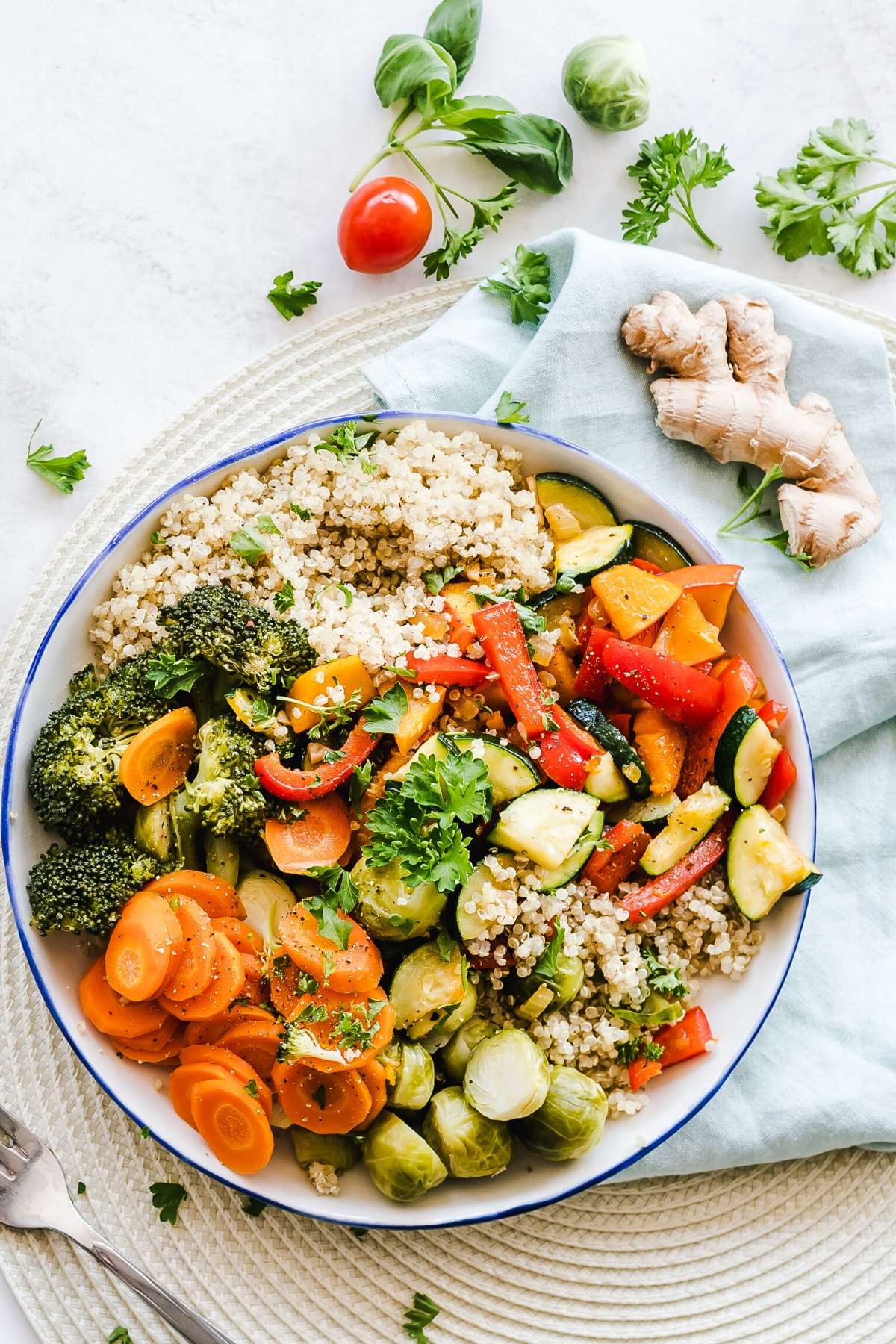
9. Soak and sprout foods
If you find that you feel really tired or bloated after eating a plant-based meal, then you might try soaking and sprouting your foods. Beans, nuts, seeds, and many grains can all be soaked before being cooked.
While it does take extra time to soak and sprout your foods, it can make all the difference in how your body digests those foods.
10. Consume minimal refined sugar
While eating sugar can give you more energy in the short term, you’re probably familiar with the energy crash that can occur once the sugar high wears off. It’s important that you wean yourself off too much refined sugars.
it can be hard to get over a sugar addiction, but you can move toward natural sugars from fruits and dates to help.
See my related article with the benefits of going sugar-free.
Vegan Fatigue FAQs
It is definitely possible that the cause of your fatigue is that a vegan diet is not working for you. There are some health risks that come with a vegan diet, and not everyone knows about these risks. Consider the differences between vegan and vegetarians and think about expanding your dietary choices.
If you determine that a vegan or plant-based diet isn’t for you, then you might need to consider re-introducing meat back into your diet.
It’s impossible to list all the potential causes of fatigue, so it’s probably a good idea to consult a healthcare provider to rule out any major nutrient deficiencies or diseases that may be causing you to feel fatigued.
You can also check out this post with reasons and tips to help if you’re feeling tired all the time.
More Health Articles You Might Like
Conclusions
If you are on a vegan diet or a plant-based diet and experiencing fatigue, there are several ways to try and feel more energetic. If your tiredness does not improve, then it may be time to consider seeing a dietitian or your doctor to rule out other conditions.
Don’t forget to join my newsletter list to get exclusive clean eating recipes and tips. The newsletter is 100% free with no spam; unsubscribe anytime.
About the Author: Carrie Forrest has a master’s degree in public health with a specialty in nutrition and is studying to be a holistic nutritionist. She is a top wellness and food blogger with over 5 million annual visitors to her site. Carrie has an incredible story of recovery from chronic illness and is passionate about helping other women transform their health. Send her a message through her contact form.
Note: this post is for informational purposes only and is not intended as medical advice. Please consult your healthcare provider for recommendations related to your individual situation.





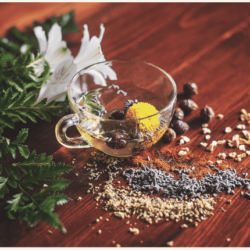
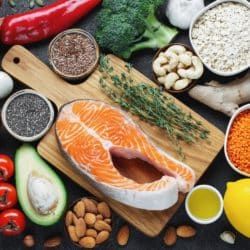



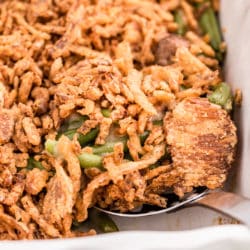
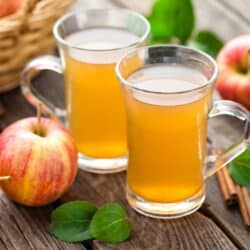

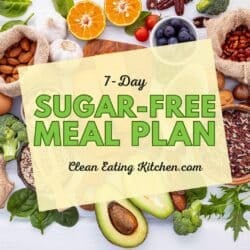







Carrie, I am so glad to read your post, for two reasons. 1, because I am so happy that you are on your way to feeling better and that you have found the right help and have found some solutions that are working for you. But also 2, that you are badass and brave enough to share yourself with all of us! It is so hard to put yourself out there, to show the world your *whole* health picture. And especially difficult as plant-based people, when we feel the pressure to “represent” the lifestyle in a positive light. I think this post is a beautiful and candid account of what it’s actually like to maintain health in this modern world. It may take adjustments! And that goes for everyone, regardless of lifestyle.
I want to say I especially appreciate you touching on the all-too-common issue of over-restricting, which Matt and I see all the time in our community. I think this is one of the main reasons that people get run down or over-burdened, and then turn away from veganism. As well, it’s so great to see you acknowledging a greater need to monitor your protein! I know it’s not popular in the vegan community, but I think a lot of people don’t take it seriously enough (which you know, since I tend to shout it from the rooftops, haha). It’s interesting, but almost every single client I’ve worked with has seen an incredible difference in energy and blood sugar stability when they begin to make a conscious attempt to eat a solid source of protein with every meal.
Anyway, thanks for being willing to be open. It means so much to our community. And also, thanks for supporting my Earth Day endeavors! I’m bummed you won’t be able to make it, but hopefully we’ll be able to get together somewhere in SoCal sometime soon. =)
Cheers lady! So glad you’re feeling better!
Thank you, Sayward! I so appreciate you commenting on this post, it really means a lot to me. And, of course, I think you already know how meaningful your work has been to me. Matt also left a really supportive on my FB page, which also made me feel really good.
Anywho, the adjustments within the spectrum of plant-based living are much wider than I ever realized, and the over-restriction did me more harm than good. I do hope that this conversation continues for anyone following or interested in a plant-heavy diet. It’s taken me a long time to realize this, but I do believe people have different needs and perhaps just need help figuring out what resources are available and how to incorporate those changes into their own realities.
what a great post, carrie! i think these tips are helpful for anyone, vegan or not, especially during this cold, dark winter. i’m glad you found some solutions to your problems. being vegan, it’s so hard to not think about our diet if we aren’t feeling well, if only because others judge us more.
Thank you for your support, Caitlin. I wish I could blame my low energy on a cold, dark winter, but we’ve had the warmest, sunniest winter here in CA that I can ever remember, which, all goes to show, that at least for me, this is not a weather-related incident. Although, I should say that I bought a light box to treat the SAD that I sometimes experience living along the coast in CA in the summer when it is often foggy for days or weeks at a time. :0)
Carrie, I really appreciate your honesty about your journey, including the ups AND the downs. I am not overweight (BMI is 21) and I don’t have any health issues, but the ultra-healthy GBOMBS eating strategy leaves me tired and drained too. Most of all, it leaves me feeling defeated every time I stray. I’ve been following it for 2 years now. The first year was easy. The second year I was just plain drained. I know it all makes sense, but I have to find a better long-term plan that works for me. I don’t think a certain diet is a success OR healthy if I feel bad about myself. PS-Love your app and your posts!!
Thank you, Gail, for your words of support. Well, since this does seem to be a topic of interest, then I suppose I’ll be writing more about it, especially about the adjustments I’m making to make sure I have the energy I demand (I say “demand” because I refuse to live my life feeling crappy…I spent my whole adolescence and early adulthood feeling crappy). I do very much believe in the principles and ethics behind a whole foods, vegan diet, but there must be some enhancements that some of us require to feel our best, and I am intrigued to continue experimenting and figuring out what those are.
Keybiotics…that’s the name of the company with the great info..mercial, but great info nonetheless.
Thank you for your input, Connie!
And the recommendation for vitamin D is that anyone who lives north of Los Angeles should be supplementing with vit D…..
Another thing you may want to explore….candida….it is estimated that 80% of Americans have it. There is a documentary/infomercial-ish called The American Parasite…google it…it talks about the food industry and what they have done to us. Fatigue is one of the biggies they talk about. I don’t remember the name of the company that has this online, but a great deal of the info is from that book Sugar, Salt, Fat. I highly recommend watching it….
What a great post! Like you Carrie, I saw a great improvement in my energy level when I started taking vegan protein powders and focusing more in strength and flexibility than cardio. I never been so in shape 🙂
I agree, everyone’s journey is different, but I do admit some vegans do abandon to quickly. Don’t give up! There’s so much too learn and that’s the fun part.
Well, I just love your positivity, Nezumi…we are soul sisters in that regard. 🙂 I totally agree that the learning process about healthy living is so fascinating AND fun, and I am so grateful that I have the time and interest to do so. I appreciate you sharing your thoughts about the exercise stuff, too.
Thank you for this post! I have also been dealing with fatigue, and I’m going to think about some of these factors as I consider next steps. I’m a vegetarian that eats eggs a few times a week and avoids dairy 95% of the time. I hate to say that occasionally I have thought to myself “is this because I’m not eating meat?” but I do want to make sure I’m considering all the options when thinking about my health. That said, I’m taking lots of steps before actually considering that an option such as tons of research, supplements, etc. I got my vitamin B12 tested and it was in the normal range, but on the low end, with a note that some people struggle with symptoms when their levels are under 200 pg/mL so I definitely started supplementing with that. Vitamin D supplements have helped too!
Anyway, thanks so much for sharing and it’s nice to feel like it’s not just me!
I’m so glad you chimed in, Liz, and mentioned vitamin D. I’ve heard so much about this recently. Also, I’m pretty convinced that fatigue is something that meat and non-meat eaters have to deal with, especially considering this crazy, hectic world we live in. I thought about you when I was mentioning the sprouting thing. I made sprouted oat groats last week and they were sooooo good. I’ll write about it soon. Xoxo.
Great list of tips! There are a couple new suggestions on the list for me. You have several variables in your health that most of us don’t have to take into account but I thought I’d add two causes for fatigue that are common for me: low iron and low B12. If I’m feeling rundown, it’s almost always because I’m low on iron and I discovered that even if I’m eating high iron foods, if I’m low on B12, my body won’t absorb the iron. Now, I’m very careful to ensure I’m getting adequate amounts of both.
Wow, great tip Carolyn! Testing my iron level is one thing I am going to do at my next physical and that’s very interesting about the connection between B12 and iron absorption. Thank you!
This is very interesting to me too. I try to eat whole foods plant based for my health. I recently wen through bouts of insomnia and sought medical help too. I am feeling much better when I sleep better. I supplement with plant protein powder too. I feel much better doing this. I lift pretty heavy weights two days a week and I make sure to have more protein on these days. Otherwise I feel weaker when trying to lift and I have zero energy the next day. If I am careful to consume enough protein I have a good session of lifting and feel better the next day. It seems you really have to find the best combination of foods/supplements/meds for yourself. Thanks very much for sharing what has worked for you. I am always inspired by your research and information.
Thank you for your comment, Dawn! I did a strength class this morning and gave some thought to making sure I got a good quality protein source afterwards. I don’t think I was giving myself enough credit for how athletic I am and that that undoubtedly impacts my needs, just as you suggested. Do you have any thoughts on the best way to replenish your energy after an intense cardio workout? I find that I am the most tired the day after a long hike or a Zumba class; I’d love to hear your thoughts.
I live in Alabama and in the summer it is crazy hot here. Consequently any cardio in the summer —–perspiration—gallons. One can become dehydrated very easily. I read somewhere–sorry can’t remember where–but it was a legit source–that dehydration, even slight can cause fatigue too. So with any cardio, hiking, or just walking, I make sure to drink plenty. I have also found that mixing juice and water helps me. I have also read that strength coaches recommend an easily digestible source of carbs mixed with protein after weight training. When I do this I don’t feel it makes me crave sugar or sweets. But that is not usually a struggle for me–just all food in general. Ha! With your nutrition/diet education you probably know about that carb thing after exercise.
Hi Dawn, thanks for sharing! It’s so funny because even though I’ve taken tons of nutrition classes, I just never really thought I needed to be careful about my intake of protein and/or carbs. I’m giving a lot more thought to it, though, in light of how I’ve been feeling. I’m also finding that alternating cardio and weight training or even taking days off between my exercise is helping my energy levels. The trade-off is that I just to accept the fact that I can’t overtrain, which I’m sure wasn’t good for me anyway.
Yes B12 and also vitamin D are of special concern. Most people are low or deficient in both of these vitamins and unfortunately they need to be supplemented. I alternate between a vegan B12 supplement and spirulina for B12. I try to get vitamin D from sun exposure during the summer. I don’t get out in the sun as much in the winter so I take D2 supplements in the winter. Everything else I get in more than sufficient quantities from the food I eat.
I am also low in B12 and iron. I take bcomplex everyday, but have not been taking my iron. Feeling run down again. I heard about Sirulina and might start taking this supplement. It’s an all in one for B12, iron, magnesium and more. I have not read about research on this but here is more information http://en.wikipedia.org/wiki/Spirulina_%28dietary_supplement%29
Has anyone tried this supplement? Would love to know if you are B12 and iron deficient and have seen results. Being low in B12 has caused an autoimmune disorder in me called Frontal fibrosing alopecia (FFA) which is hair loss around the forehead, eyebrows. This can be caused more if my B12 is too low because I cannot fight it off. If I keep my b12 up with supplements, then my symptoms will not attack again. thanks for sharing because I really thought I was the only one with deficiencies in both these categories!
Thank you for sharing, Toni. I know there is a lot of information about vegans and the need to supplement with B12, but, for some reason, I never thought that I could be low in iron. I’ve just started supplementing and I am going to ask my doctor about getting occasional monitoring for my iron levels in the future. I think this could have been another reason I was feeling so fatigued.
I think that part of the problem is that a lot of people become Vegan for primarily weight-loss, rather than for health. Because of that, many of them restrict calories or restrict healthy Vegan foods too much – leading to hunger, exhaustion, and defeat. So many Vegans I see are not only Vegan but also have a long list of other things they won’t eat (grains, nuts, onions, garlic, fruit, calories, etc) – and then when they go back to SAD, they say “Veganism didn’t work for me, I was always exhausted!”
Thank you for your thoughtful comment, Anna. I’m pretty sure I’ve fallen into that trap of being too restrictive with my food choices as well. I do have to be gluten-free otherwise I get a skin rash, but there are so many gluten-free grains available that I’m learning to enjoy. Plus, I’ve actually found my weight maintenance to be easier when I am less restrictive, ironically.
Thanks for talking about this topic. I too also tried to eat vegan so that I would feel better and loose weight. I have digestive issues as well as intolerance’s to dairy, cheese, coffee, beef and other foods. I tried to follow Carrie’s blog for great food ideas as well as the Eat to Live plan. I was confused about the quantity of foods on a vegan lifestyle because I was so used to restricting calories on other diets. I think vegan’s really need to teach about calories and 3 meals a day versus, smaller portions and how many fruits to eat, protein shakes and vegan dishes in a day. I still think calories are just as important if you are trying to loose weight but it’s hard to find out how many calories are in vegan dishes. I was recently searching for food plans on a vegan diet and found a few online. It would be nice to see some vegan eating plans. Thanks to Carrie for blogging about what she eats. It helps tremendously!
Thank you for your note, Toni! I think a lot of people do gravitate to a vegan diet (or other specialized diets) to help lose weight and, while it can be a strategy, too much restriction can lead to health problems, which might be part of what I’m dealing with.
I’ve been on a vegan diet for about 4 months. My reason was strictly health related. My cardiologist told me that I had plaque build up on the outside of my arteries and he suggested my going on a plant based diet. Unfortunately he didn’t direct me to a nutritionist to help me with this lifestyle change. I was eating a Paleo diet before all of this. I’ve been very strict with my new diet and I feel exhausted all the time. I hate having to make special meals constantly 3-4 times a day and I feel very depressed. Today I went out to eat with my husband and I had sushi fish. Mentally I felt upset that I did that but I’m not sure what to do. I eat some fruit and veggies and make homemade bean burgers when I have the energy. I’m just feeling very lost!
Marsha
Hi Marsha, I think it would be helpful to work with a doctor who really knows nutrition and can monitor your labs. I would suggest trying to find a functional medicine practitioner. Your fatigue is a message from your body.
Why do you say it is hard to find out calories in vegan dishes? Especially if you’re using whole foods in dishes, it’s easy to calculate.
I agree Anna the vegan diet has to be done correctly. I adopted a plant based diet for health reasons and my weight loss is but a byproduct. I believe making vegetable and fruit juices is an essential part of a healthy vegan diet. I am able to get concentrated amounts of nutrients into my body that would be difficult otherwise. I don’t eat all plant based foods, as I stick to alkalizing non-hybrid foods. I do mostly eat vegetables, fruits, and nuts. I limit my grains to older grains like kamut and spelt because most of the wheat we eat today is GMO wheat and I believe is harmful. One thing, I don’t restrict calories. I am a calorie junky just because I like to eat, but I eat good whole food plant based foods. I do have a specific nutritional list I choose my food from and it has been wonderful to me. I haven’t been vegan as long as Carrie. I have only been vegan for 2 years now, so I will have to wait for the 5 year period to see how I feel then. I know right now I feel super awesome. I am 46 and I lost 25lbs and I am back to my weight when I was in my 20’s. My energy level is also back to when I was in my 20’s and my endurance is through the roof. I haven’t been sick since I adopted a plant based diet, not even a cold.
Ohhhh, I LOVE hearing a success story like yours!!! Question: do you sprout your grains, nuts, or seeds? I’m just curious?
Sometimes I do but not often. They are still nutritious without sprouting and the nutrients are available. Sprouting is good but it is not an end all if you don’t sprout. I wrote an article about soaking almonds on my site which addresses the pros and cons of soaking and sprouting almonds. I don’t want to post the link here because I don’t want it to appear that I am spamming you. Just search for almonds on the or if you want I can leave the link here.
Also check out the nutritional list to see the foods I can choose from. Remember that B12 and D are problems areas for everyone, B12 especially for vegetarians/vegans.
Thanks for not spamming, but I enjoyed the article. Here it is for anyone else who wants to read it. 🙂 http://www.naturallifeenergy.com/should-i-soak-almonds-benefits-of-soaking-almonds/
Carrie I am curious as to what you daily diet is like, food and liquid. If you don’t mind could you post what and how much you eat and drink throughout a typical day or either send it to me in an email? [email protected]
I’ve also seen the problem of people eating a large amount of refined or “fake” foods, such as soy burgers or potato chips, that are just an unhealthy but are technically vegan, and of course they didn’t feel any better on that kind of diet. Nowadays there can be a huge difference between vegan food and healthy food, so I tend to describe my eating habits as “unrefined plant foods without any added sugar or oils”. I think once you say vegan, people imagine all those products on the “natural foods” aisle of the grocery store that are loaded with salt and oils and processed grains.
I have never met a Vegan that went vegan for weight loss. I’m sure they exist, but most of the Vegans I know and read about do it for ethical reasons. I was dieting when I turned Vegan, but that wasn’t the reason I became Vegan. I did it for ethical reasons. I never lost any weight either, I’m trying to put it on actually and my muscles are flat. I look worst on a Vegan diet than I did when I was eating meat.